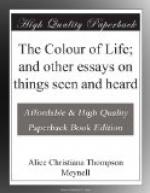And the landowner feels it. He knows quite well, though he may not say so, that the Corot trees, though they do not dwell upon margins, are in spirit almost as extraterritorial as the rushes. In proof of this he very often cuts them down, out of the view, once for all. The view is better, as a view, without them. Though their roots are in his ground right enough, there is a something about their heads—. But the reason he gives for wishing them away is merely that they are “thin.” A man does not always say everything.
ELEONORA DUSE
The Italian woman is very near to Nature; so is true drama.
Acting is not to be judged like some other of the arts, and praised for a “noble convention.” Painting, indeed, is not praised amiss with that word; painting is obviously an art that exists by its convention—the convention is the art. But far otherwise is it with the art of acting, where there is no representative material; where, that is, the man is his own material, and there is nothing between. With the actor the style is the man, in another, a more immediate, and a more obvious sense than was ever intended by that saying. Therefore we may allow the critic—and not accuse him of reaction—to speak of the division between art and Nature in the painting of a landscape, but we cannot let him say the same things of acting. Acting has a technique, but no convention.
Once for all, then, to say that acting reaches the point of Nature, and touches it quick, is to say all. In other arts imitation is more or less fatuous, illusion more or less vulgar. But acting is, at its less good, imitation; at its best, illusion; at its worst, and when it ceases to be an art, convention.
But the idea that acting is conventional has inevitably come about in England. For it is, in fact, obliged, with us, to defeat and destroy itself by taking a very full, entire, tedious, and impotent convention; a complete body of convention; a convention of demonstrativeness—of voice and manners intended to be expressive, and, in particular, a whole weak and unimpulsive convention of gesture. The English manners of real life are so negative and still as to present no visible or audible drama; and drama is for hearing and for vision. Therefore our acting (granting that we have any acting, which is granting much) has to create its little different and complementary world, and to make the division of “art” from Nature—the division which, in this one art, is fatal.
This is one simple and sufficient reason why we have no considerable acting; though we may have more or less interesting and energetic or graceful conventions that pass for art. But any student of international character knows well enough that there are also supplementary reasons of weight. For example, it is bad to make a conventional world of the stage, but it is doubly bad to make it badly—which, it must be granted, we do. When we are anything of the kind, we are intellectual rather than intelligent; whereas outward-streaming intelligence makes the actor. We are pre-occupied, and therefore never single, never wholly possessed by the one thing at a time; and so forth.




